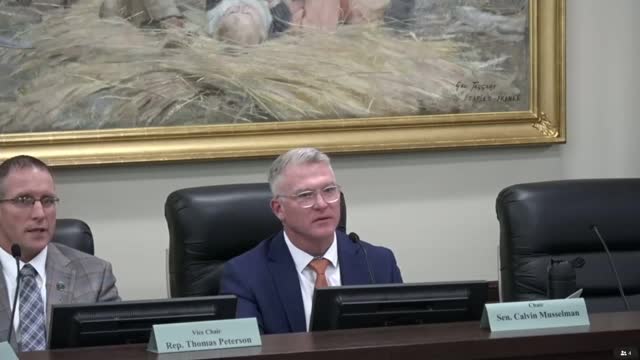Lawmakers hear Run Elite athletes, sports commission asks for expanded RFA funding ahead of 2034 Olympics
Get AI-powered insights, summaries, and transcripts
Subscribe
Summary
Members of a Utah legislative committee heard presentations from Run Elite athletes and the Utah Sports Commission urging continued and increased RFA funding to support elite-distance running, community engagement and to prepare venues for anticipated 2034 Olympic-related test events.
A Utah legislative committee heard presentations from the Run Elite program and the Utah Sports Commission urging continued state support to retain elite distance runners in Utah, boost local economic impact from sporting events and help prepare venues for anticipated 2034 Olympic-related test events.
Run Elite co-founder and executive director Isaac Wood told the committee that state support helped the program keep talented athletes in Utah and grow the state—s profile in distance running. "It has been an amazing experience to see the value of the community impact that these runners have made," Wood said, citing Olympic medals and local youth engagement as outcomes.
The presentations explained why the state—s investment matters. Landon Southwick, a Run Elite co-founder, said "the state of Utah has always been a home for running," and credited recent collegiate and community success — including national championships at the college level — with creating infrastructure that helps athletes stay and train in-state. Athlete Clayton Young described staying in Utah as a career decision supported by Run Elite: "I was the athlete before Run Elite program existed... Run Elite stepped in" to provide medical, travel and coaching support that helped him make his first Olympic team.
Olympian Courtney Frerichs, who said she moved to Utah this summer, described Run Elite support after an injury and the challenge of a sport that lacks formal leagues: "Run Elite was really able to step in and provide a lot of the opportunities and funding that I had been receiving prior ... that just makes what we do possible." Presenters and committee members described routine community outreach by the athletes — school visits and youth clinics — as central to the program—s mission.
Jeff (last name not specified) of the Utah Sports Commission outlined the commission—s broader RFA (request for applications) strategy and economic pitch. He cited a recent consultant review that judged Utah—s sports strategy competitive with other states but warned that "Additional funding is will be required" to keep pace with other states that are expanding incentive funding to attract major events. The commission described a multi-year pattern of events and said some test events for 2034 Olympic-related preparations could number between "25 to 50" and will require continued venue and organizational support.
Speakers pointed to specific examples of potential economic impact: a single entertainment-sport event (Monster Jam) was cited with reported comparable economic impacts of $130 million to $150 million in Orlando, and organizers referenced recent successes including multiple Ironman World Championships hosted in Utah and athletes who have relocated to the state after Run Elite support.
Committee members voiced support for maintaining momentum. Senator Owens said committee efforts should "prioritize and help you seize the moment" and expressed general support for the RFA work. The presentations concluded and the committee voted to adjourn; the chair called for a motion to adjourn, and the motion passed unanimously.
No formal funding decision or specific appropriation was recorded in the transcript. Presenters requested continued or expanded RFA funding and cited a consultant recommendation for additional funding to remain competitive in attracting major sports events and to meet obligations related to Olympic test events.
